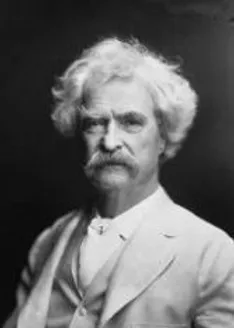Mark Twain
When one ponders the state of the bookstore industry, a famous line attributed to Mark Twain comes to mind: “The report of my death has been grossly exaggerated.”

Tom Corson-Knowles
Reports of a death knell for the print book and its retailers apparently are just as wrong. One such assertion was contained in a promotional email recently propagated by Tom Corson-Knowles, a book marketing entrepreneur and originator of book publisher TCK Publishing. The piece reminded me of a column by Timothy Egan in the New York Times, published shortly before, which took the opposite position – and showed its validity with evidence.
Book Rebound

Timothy Egan
While conceding that almost a quarter of adults in this country haven’t read a book in the past year (I would have guessed the figure was much larger), Egan wrote, “But the book – with a spine, a unique scent, crisp pages and a typeface that may date to Shakespeare’s day – is back. Defying all death notices, sales of printed books continue to rise, as do the number of independent stores stocked with these voices between covers, even as sales of electronic versions are declining.”

Maxwell Anderson
Similarly, Maxwell Anderson wrote on his website, The Weekend Reader, that the number of independent bookstores had increased by 27 percent since 2009. Book sales at bookstores “increased last year for the first time since 2007 … and are up another 6 percent this year.” He wrote that blog in March 2017. Concomitantly, he reported, sales of eBooks fell 14 percent from 2014 to 2015, and eBooks fell from 35.9 percent of total book sales in April 2015 to 32.4 percent in April 2016.
So the ascendance of print book sales appears not to have been a fluke that occurred over a few years. The trend has continued to today. But it indicates more than a renewed interest in print books: a rise in the interest of literature in general.
“Nearly three times as many Americans read a book of history in 2017 as watched the first episode of the final season of ‘Game of Thrones,’” Egan wrote. “The share of young adults who read poetry in that year more than doubled from five years earlier.” So, he said, “even with a president who is borderline literate, something wonderful and unexpected is happening in the language arts. When the dominant culture goes low, the saviors of our senses go high.

Game of Thrones
“But also, at a time when more then a third of the people in the United States and Britain say their cellphones are having a negative effect on their health and well-being, a clunky old printed book is a welcome antidote.”
Hanging out at the bookstore
Sure, Anderson said, you can read Amazon reviews of a book online, “but it doesn’t completely replace the value of sitting in an old chair and thumbing through the pages yourself. Unless Amazon develops an experience like that, physical bookstores will always offer unique value.
“Sometimes all we care about is getting the book so we pick the cheapest, most convenient way to buy it. Other times we want to have the experience of being in a bookstore. We want to get lost in the stacks, smell the pages, read the handwritten recommendations of the bookstore staff.”
Anderson ascribed the revival of local bookshops to two movements. One is a shift from globalism to localism. The other is a trending away from mass production – exemplified by such phenomena as the auto assembly line, chain restaurants, mass marketing, and pop culture – to “individualized production, niche marketing, and local culture.” Google and others have allowed advertisers to target specific demographics, even individuals. Green markets and craft beers are adding to our food and drink options. Pop culture is undergoing a transformation into niches through such media purveyors as Spotify, YouTube and Netflix.
(I would take a slightly different tack: The increase in local bookstores isn’t because of those two phenomena, but a manifestation of them.)
Books Plus

The Book Cellar
Anderson omits a big reason for the rise in independent bookstores, one that reflects the trend toward localism. These bookstores often are providing more than books. Many have become de facto community centers. A good example is The Book Cellar in downtown Lake Worth Beach, Florida, which has a café, is sometimes used as a nursery, presents jazz and other musical events, and holds author appearances.
“Among many there is a growing dissatisfaction with our increasingly digital world,” Anderson wrote. “It makes us feel less than human … One of the greatest human needs of our moment is to be known. Our society is facing an epidemic of loneliness. The number of people who say they have no friends has tripled in the past thirty years. As a result a small number of people are revolting against the digital world in favor of something more personal, more real. More analog.
“Buying books is just another example of an experience that only becomes more valuable the more the world is saturated with a digital alternative. I can buy a book from Amazon at a greater discount than from The Tattered Cover in Denver. But what discount do I apply to the ability to look a bookseller in the eye and talk about what we’re reading together?”

